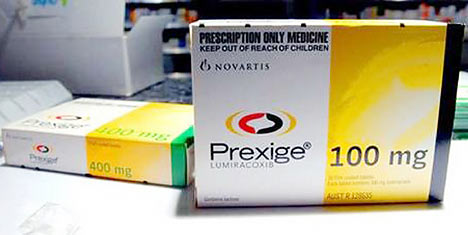 Painkillers such as Ibruprofen, which is commonly used to reduce pain caused by inflammation, have been linked to increased risk of heart disease.
Painkillers such as Ibruprofen, which is commonly used to reduce pain caused by inflammation, have been linked to increased risk of heart disease.

 Painkillers such as Ibruprofen, which is commonly used to reduce pain caused by inflammation, have been linked to increased risk of heart disease.
Painkillers such as Ibruprofen, which is commonly used to reduce pain caused by inflammation, have been linked to increased risk of heart disease.

London: The drug Prexige (lumiracoxib), used to treat osteoarthritic pain has been suspended from sale by health regulators in the UK and Germany over liver damage fears.
Manufacturer, Novartis, is informing regulatory agencies around the world of these changes, which come after similar actions in other countries in recent months.
Novartis will also comply with a request from the Austrian health authority to suspend sales pending a final decision by the Committee for Medicinal Products for Human Use (CHMP), which reviews medicines in the European Union.
Patients taking Prexige in the UK, Germany, and Austria are advised to consult their medical practitioner.
Prexige was precribed as 100 mg once-daily treatment for osteoarthritic pain following EU approval through the Mutual Recognition Procedure (MRP) in October 2006. Itis also marketed and sold in Belgium, Cyprus, Hungary, Malta, Portugal, and Sweden.
Other EU countries may decide to independently suspend the marketing authorization or sale of Prexige ahead of a decision by the CHMP, which is expected in December.
Prexige is part of a class of drugs known as a COX-2 inhibitors and liver enzyme changes are a known side effect of these and traditional non-steroidal anti-inflammatory drugs (NSAIDs).
The ban comes The actions in Europe come after an Urgent Safety Restriction was initiated in August 2007 for the Prexige 100 mg dose. Prexige was first withdrawn in August 2007 in Australia where a number of liver side effects were reported, including two deaths, associated with the use of Prexige at doses higher than 100 mg. No deaths have been reported worldwide with the 100 mg dose.